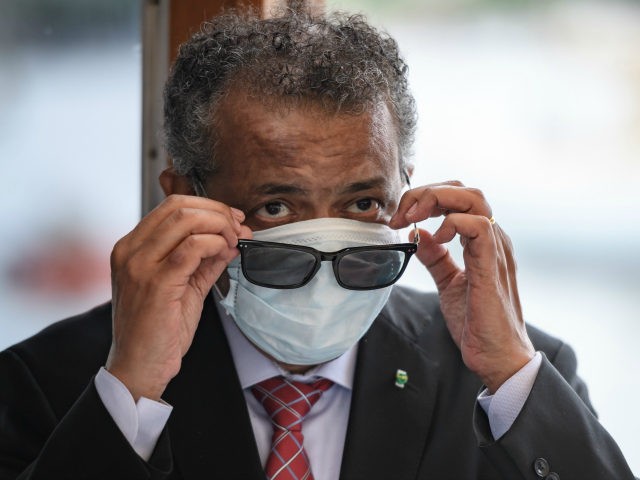The World Health Organization (W.H.O.) admitted on Tuesday that global coronavirus cases have dropped by 19 percent over the previous week, and of the 4,000,000 cases tested worldwide 98 percent were found to be the less-lethal omicron variant.
The W.H.O. has declared in a coronavirus update that during the week of February 7-13, 2022, there were just over 16 million new cases and just under 75,000 new deaths reported globally. Nearly all regions of the world experienced decreases in coronavirus cases, with only the Western Pacific Region recording an increase of cases.
Despite the positive news surrounding a global decline in cases, the W.H.O. is still demanding “wealthy” countries pay $16 billion in cash up front to drive the W.H.O. ACT-Accelerator initiative — a plan to fund coronavirus schemes in developing countries, including mass vaccination rollouts — with a total of $23.4 billion needed for the 2021-2022 budget for the project.
The director-general of the globalist organization, Dr. Tedros Adhanom Ghebreyesus, has said that the need to finance W.H.O.’s initiatives is “urgent,” and if wealthy nations “pay their fair share” in “solidarity,” then the W.H.O. can end the “global health emergency” in 2022.
Tedros has also insisted that omicron is not a “mild disease” and that it is causing “hospitalizations and deaths, and even the less severe cases are inundating health facilities.”
Not all of the W.H.O. directors are in agreement, however. W.H.O. Regional Director of Africa Dr. Matshidiso Moeti, in a virtual press conference, said there is a “light at the end of the tunnel” for the continent, and “this year we can end the disruption and destruction the virus has left in its path, and gain back control over our lives.”
Moeti made this statement despite Africa having a low vaccination rate, which she states as being 11 percent of the adult population. She also indicated that the continent is beginning to enter a “new phase of the COVID-19 pandemic,” while expressing confidence in Africa’s future approach to outbreaks.
“We must use the lessons learned over the past two years to strengthen our continent’s health systems so that we are better prepared to handle future waves of the disease,” said Dr. Moeti. “Since new variants have fueled waves, it is critical that countries strengthen their capacity to detect them through improved genome sequencing. This will also ensure we spot other deadly viruses swiftly.”

COMMENTS
Please let us know if you're having issues with commenting.